ASTANA — The Grand Hall of the Astana Opera radiated with celebration and reverence on Nov. 17, as Kazakhstan honored one of its most beloved cultural icons, Bibigul Tulegenova, for her upcoming 95th birthday. The concert, aptly titled Kazaktyn Bulbuly (Kazakh Nightingale), showcased the life and legacy of a woman whose name is inseparable from the nation’s musical heritage.
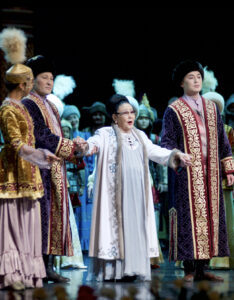
Bibigul Tulegenova performing on the stage of the Astana Opera Theater in 2019. Photo credit: Astana Opera
The evening’s program was a heartfelt tribute to her artistry, featuring a blend of world and Kazakh opera performed by laureates of her eponymous competition. Young talents performed alongside seasoned professionals, reflecting the enduring legacy of their mentor.
The concert began with a vibrant Toi Bastar (The Starter of the Celebration) from the opera Abai, performed by competition laureates Rassul Zharmagambetov and Tatyana Vitsinskaya. The Astana Opera’s orchestra, chorus and ballet brought the opening to life, setting the stage for a night of exceptional artistry.
The highlight came with Bul-Bul (Nightingale), a song forever linked to Tulegenova. Honored Worker of Kazakhstan Tolkyn Zabirova delivered the piece with deep emotion, captivating the audience and drawing an eruption of applause as the final note lingered—a fitting tribute to a legend who has inspired generations.
Meeting a living legend
Hours before the concert, I had the incredible privilege of joining a small group of reporters for an exclusive interview with Tulegenova. At 95, the Soviet-Kazakh opera singer remains a beacon of elegance, grace and intellectual vitality. Her radiant smile and luminous eyes spoke of a life fully lived, while her words carried the wisdom of an artist devoted to her craft and culture.
“Hard work is relentless, no matter what. It is through dedication, effort and education that we cultivate success. My happiness stems from my culture. Thanks to my voice, I have earned respect in the eyes of my nation. I am truly grateful and happy,” said Tulegenova.
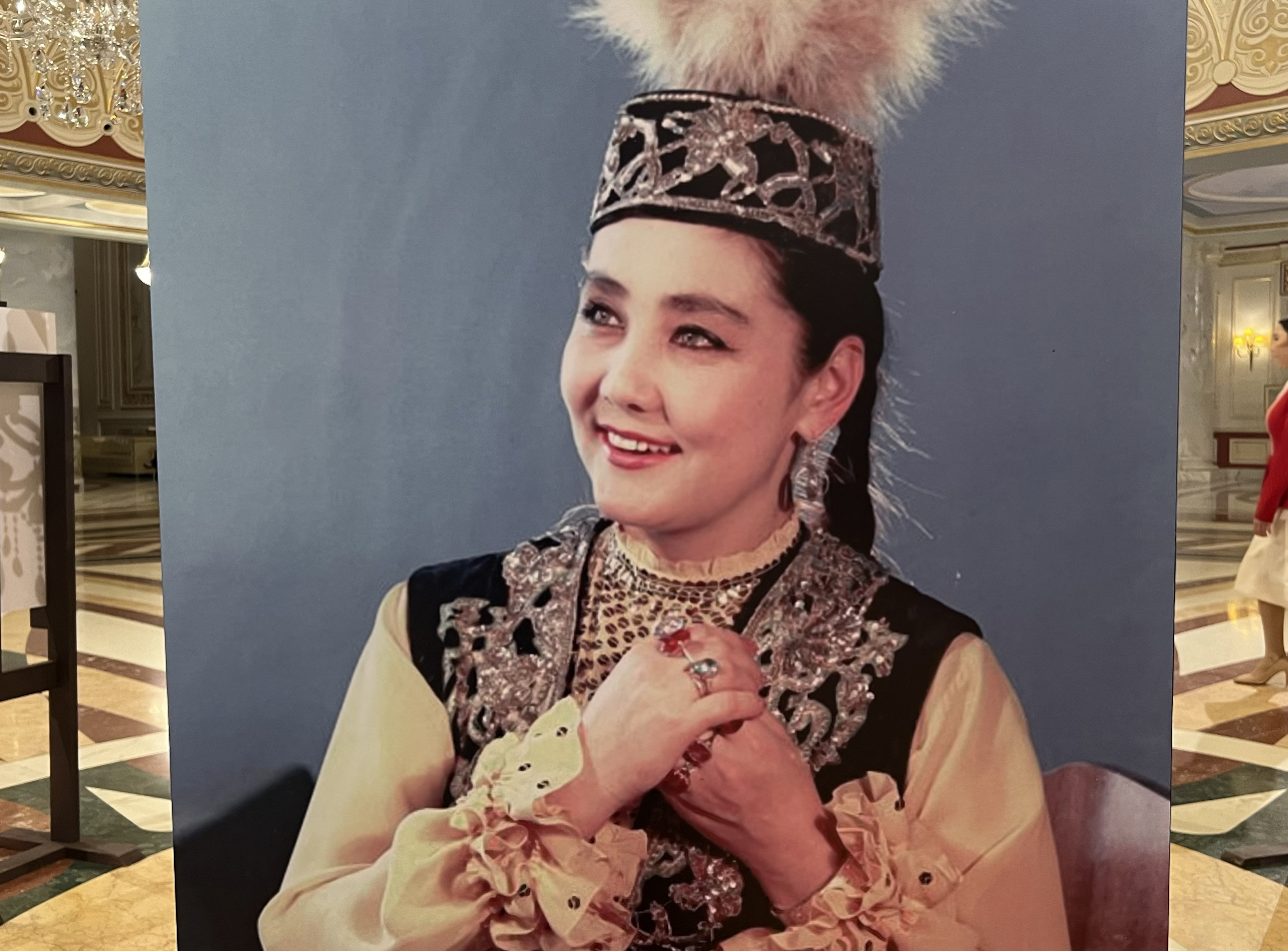
Famous photograph of Bibigul Tulegenova, used as post card during Soviet times. Photo credit: Nagima Abuova / The Astana Times
Her words reflected her enduring commitment to art, culture and hard work. Even today, she consults young singers, memorizes songs and plays instruments.
“At this age, I live in a modest three-room apartment. My piano, my lifelong companion, remains by my side—I could never part with it. Even now, at 95, I sit at that piano, playing with three or four fingers, still learning and practicing the same songs,” said Tulegenova.
When choosing a repertoire, Tulegenova approaches Kazakh folk songs, culture and operas as poetry first.
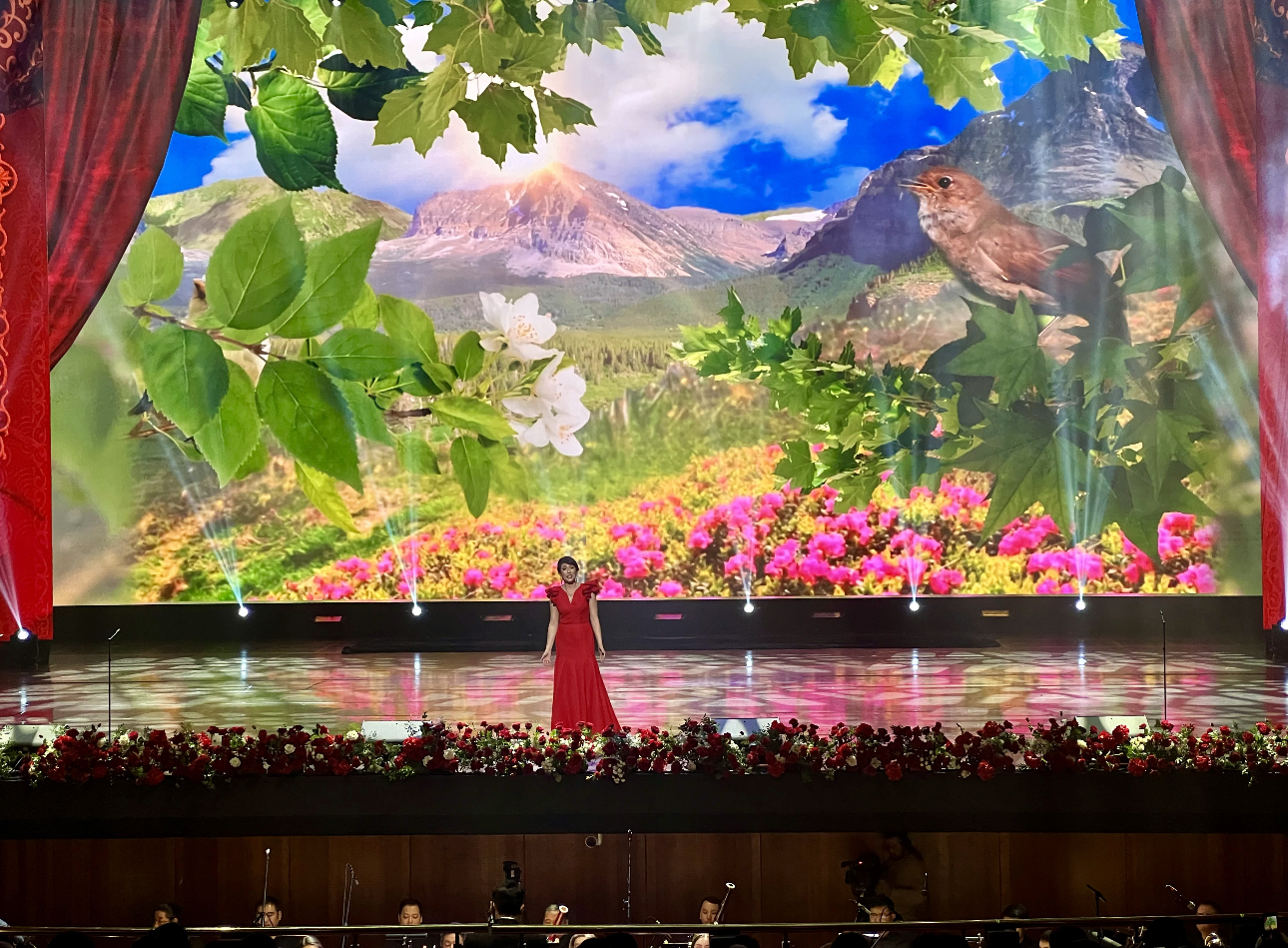
Tolkyn Zabirova performs Bul-Bul, a song forever linked to Bibigul Tulegenova. Photo credit: Nagima Abuova / The Astana Times
“I recite them as poems to truly grasp their essence, not as songs. Only after I have internalized their meaning do I transform them into music. To sing a song well, you must first understand every word and its significance,” said Tulegenova.
When journalists asked about her secret to aging beautifully, Tulegenova laughed shyly. “Oh, how would I know? I have never used much on my face, aside from a bit of stage makeup,” she said.
On caring for her legendary voice, she added, “It is a gift from God, and I have always taken care of it. I avoid cold and overly hot foods, never drink alcohol and do not smoke.”
A life shaped by resilience and talent
Born in Semei, Tulegenova grew up in a home filled with music. Her mother sang well, and her father loved playing the violin. However, her early years were marked by hardship after her father was executed in 1937, leaving her family to navigate life without him.
In 1945, Tulegenova worked at a meatpacking plant. At one of the regional amateur art contests, the young singer caught the attention of exiled Soviet writer Galina Serebryakova, who recognized her potential and took her under her wing, giving her first music lessons. Under Serebryakova’s mentorship, Tulegenova enrolled at the Almaty Conservatory, where music became her solace and her calling.
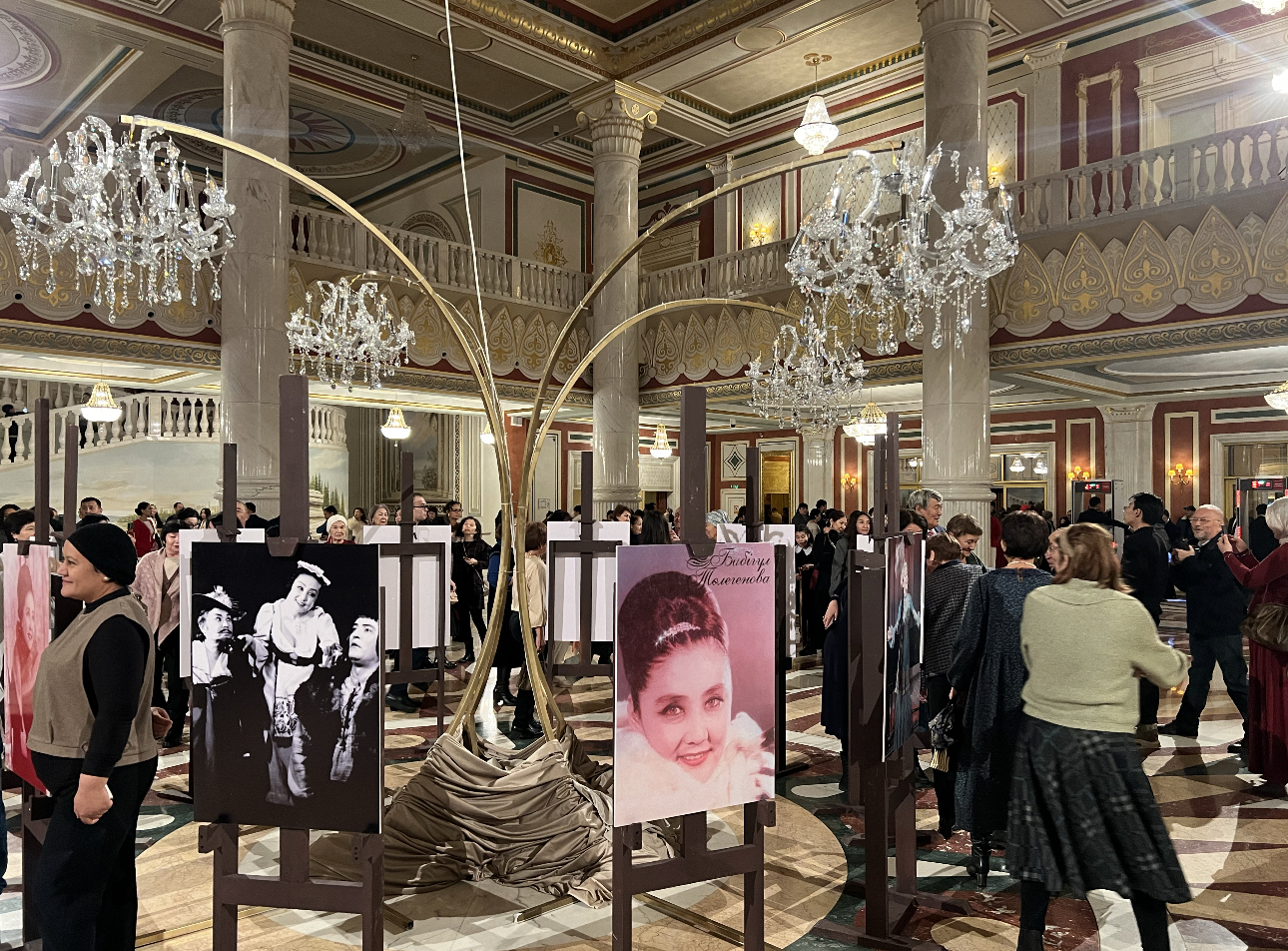
Photo exhibition dedicated to Bibigul Tulegenova at the Astana Opera. Photo credit: Nagima Abuova / The Astana Times
“My journey began with Kazakh folk songs such as Kara Torgay (Black Sparrow) and Shirkin-ai (a heartfelt expression of cherished dreams),” said Tulegenova.
“To become a great artist, one must first understand their homeland and its culture. I owe much of my success to my teachers, Galina Iosifovna Serebryakova and Nadezhda Nikolaevna Samyshina, who guided me during my conservatory years. Their mentorship helped me become the singer I am today,” she added.
From her humble beginnings to becoming a People’s Artist of the USSR and the last person in history to be awarded the highest distinction of that era – a Hero of Socialist Labor, Tulegenova’s journey is a testament to resilience and talent.
A legacy that transcends borders
Over a career spanning more than seven decades, Tulegenova has performed in the world’s grandest venues, sharing Kazakh folk songs and classical masterpieces with global audiences. Her repertoire, ranging from Verdi’s La Traviata to Kazakh compositions, has cemented her role as a cultural ambassador.
“In our time, there were only a few of us—just two or three. It was Ermek [Serkebayev], me, Rosa [Baglanova]. But today, thank God, concerts are filled with incredible talent. Our young singers, dancers and dombra players bring the art to life, showcasing their skill and passion,” said Tulegenova, reflecting on today’s generation of artists.
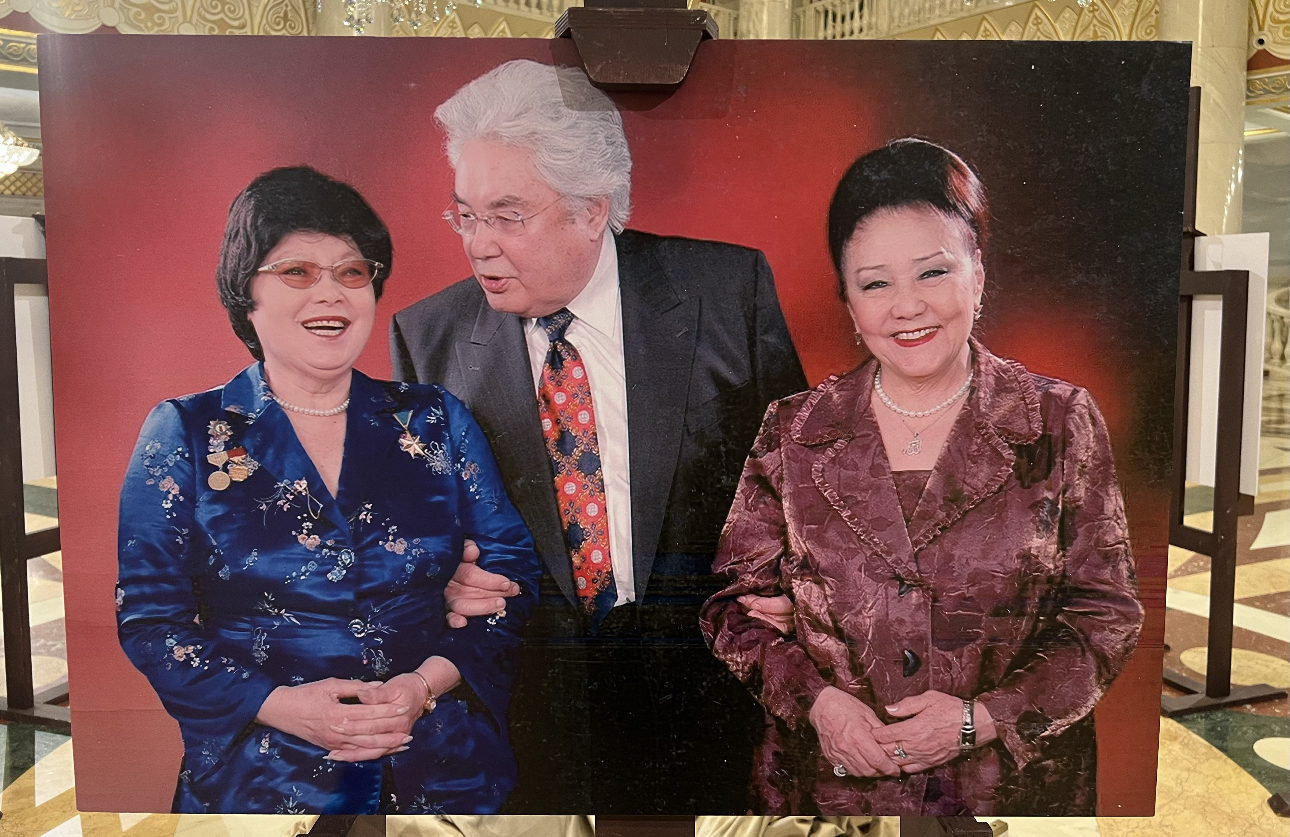
Photo exhibition at the Astana Opera. From left to right: Roza Baglanova, Ermek Serkebayev, Bibigul Tulegenova – legends of Kazakh opera. Photo credit: Nagima Abuova / The Astana Times
Irina Serkebayeva, daughter of another renowned Soviet-Kazakh opera singer, Ermek Serkebayev, reflected on Tulegenova’s invincible spirit in her book titled ‘Bibigul Tulegenova: To Love, Hope, and Believe.’
“Her bright art and incredibly pure attitude to life, her love and gratitude for every day of her life. This beautiful woman’s eyes shine with kindness and she is full of faith in people. This is despite a life full of hardships and sorrows. Bibigul Akhmetovna is an example for all of us (…) The main lesson I learned while working on the book is that life is a wonderful gift, no matter what. You just need to be able to be grateful!”
A personal blessing and a moment of grace
As the press briefing drew to a close, Tulegenova gave us, journalists, her bata (blessings), a moment I will treasure forever. Inspired, we joined the audience in The Grand Hall, where the anticipation felt tangible.
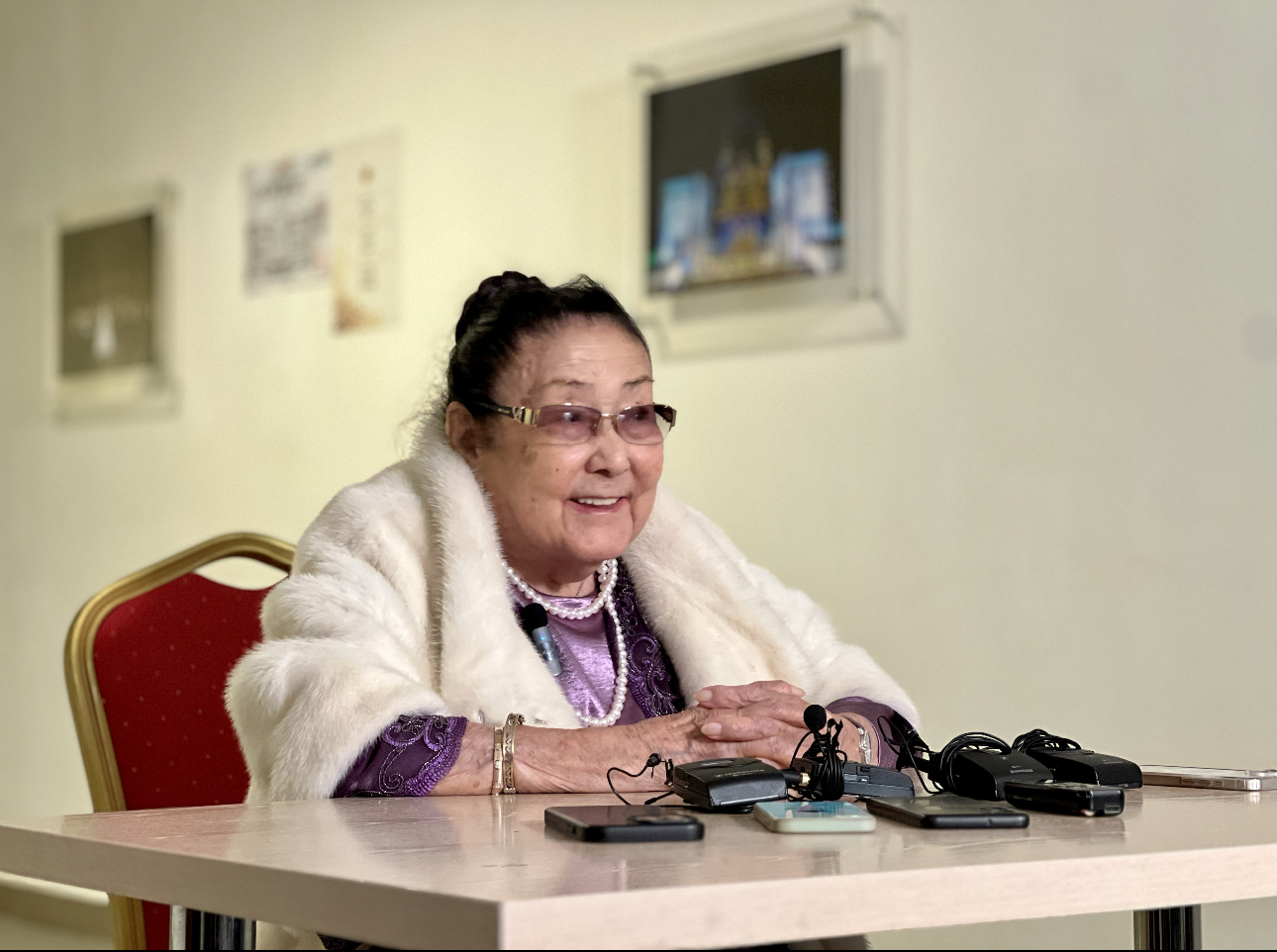
Bibigul Tulegenova at the press briefing before the concert at the Astana Opera. Photo credit: Nagima Abuova / The Astana Times
When her name was announced, Tulegenova appeared on the balcony of the Astana Opera, rising gracefully to wave to the audience. The theater erupted in cheers and applause—a fitting tribute to a living legend whose voice has become a timeless melody of Kazakh culture.

When her name was announced, Tulegenova appears on the balcony of the Astana Opera, rising gracefully to wave to the audience. Photo credit: Kazakh Ministry of Culture and Information
Her wisdom, modesty, and resilience left me with a profound sense of gratitude. Bibigul Tulegenova’s life is a testament to the power of passion, perseverance and an unwavering belief in the beauty of life, no matter the challenges.
